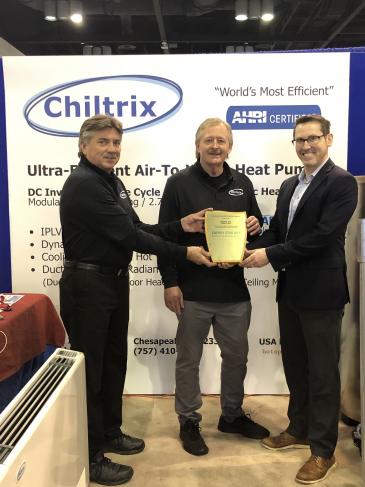2019-2020 Air-to-Water Heat Pumps
The ENERGY STAR® Emerging Technology Award (ETA) is given to innovative technologies that meet rigorous performance criteria to reduce energy use and lower greenhouse gas emissions. The U.S. Environmental Protection Agency (EPA) is pleased to recognize Air-to-Water Heat Pumps for the ENERGY STAR Emerging Technology Award for 2019.
Products that meet the performance criteria (PDF, 63 KB) will be listed on the Qualified Product List once it is determined that all Award criteria have been satisfied. Manufacturers can submit documentation for eligible air-to-water heat pumps products to EmergingTech@energystar.gov.
Benefits of ENERGY STAR Emerging Technology Award-Winning Systems:
Typical air source heat pumps take heat from outside air using a refrigerant. ATW heat pumps transfer this heat to a fluid outdoors – typically water or a mix of water and glycol – and transport this fluid into a home to provide space heating through hydronic distribution (e.g., radiant floor, radiator, or baseboard water circulation systems). These systems can also be used in a cooling mode creating chilled fluid and running it through an air coil to distribute air conditioning to a home or business. While the ATW heat pump market is small in the U.S., it is well established in Europe and China, with a global market of about 1.7M units/year1.
ATW heat pumps have numerous applications with advantages over traditional hydronic systems in new and existing homes, and advantages over forced air systems in new construction. Compared to a typical gas condensing boiler system, ATW heat pumps can offer energy savings up to 47%2 with a seasonal Coefficient of Performance (COP) of 1.7 - 3.0. ATW systems also demonstrate superior performance at low outdoor temperatures when compared with traditional air source heat pumps, making them appropriate for use throughout the United States, including cold regions. In addition to energy savings, ATW heat pump systems can provide the following benefits:
- Since the system heats water, adding a storage tank to the system will provide homeowners with efficient domestic water heating. This eliminates the need for a separate water heater and can save thousands of dollars for a homeowner.3
- All fans are located outside the home, providing quiet operation.
- Allows a retrofit to provide cooling in hydronically-heated homes, without running extensive ducts through the home.
In new construction, ATW heat pumps provide all the advantages of a hydronic system while also providing efficient electric heat, using up to 70% less electricity than electric baseboard heat. These advantages include:
- Easy zoning configurations: providing desired temperature in each room, or zone, of the home separately (e.g., the kitchen may not need to be heated as much as a bedroom)
- No space needed for large air ducts in the house design.
As a result, ATW heat pumps can save energy, even in cold climates where many air-to-air heat pumps perform poorly, provide space conditioning and hot water heating, as well as several other benefits for the consumer.
Winning Products Must Demonstrate That They Are:
- An air source heat pump that has a refrigerant to water, or water/glycol, heat exchange
- Able to provide space heating (and potentially also space cooling and domestic hot water)
- Capable of achieving a heating coefficient of performance of 1.7 or greater at full load capacity at a dry bulb outdoor temperature of 5°F and a leaving water temperature of 110°F
- Are approved for use and available for sale in the U.S. market

1 Siegenthaler, John. “Air-to-Water Heat Pumps for Low Energy & Net Zero Houses”, 2018 New York Regional Home Performance Conference & Trade Show, 2/14/2018.
2 Typical condensing boilers are approximately 90-98.5% efficient (measured using AFUE), while ATW heat pumps are at least 170% efficient at 5 degrees F, (measured using COP).
3 Comparable ENERGY STAR heat pump water heaters cost between $1200 and $2000 at retail, not including installation.
